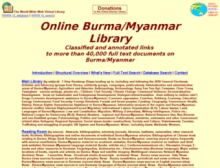Resource information
While Burma’s ethnic states are blessed with a wealth of natural resources and biodiversity, they
have been cursed by the unsustainable extraction and sale of those resources, which has fuelled
armed conflict. Instituting a system of devolved federal management of natural resources can
play a key role in resolving conflict and building a lasting peace in Burma.
Despite some ceasefires on paper, Burma remains in a state of conflict. Ongoing offensives in
Kachin and Shan states alone have left hundreds of thousands homeless. Fundamental calls for
self-determination have gone unheeded in a lack of political dialogue to end decades of fighting.
Military offensives into resource-rich ethnic areas have expanded Burma Army presence in plac
-
es previously controlled by de-facto ethnic governments. This has facilitated the rapid increase
in the extraction and sale of natural resources in recent years. Resource projects have collected
huge revenues for the army and the central government, but have not benefited local populations.
Constitutional powers place natural resource ownership, control, and management fully in the
hands of the central government. This report analyzes six key natural resources: forests, land,
water, minerals, gems, and oil and gas. In each sector, a series of laws and practices prevent
affected peoples from having a say in their own development: they cannot assess, provide input
into, or censure the management of their natural resources. Ethnic women, particularly in rural
areas, are doubly marginalized from natural resource governance.
Centralised resource control is fanning the flames of discontent and anger
. Resource projects are
causing environmental destruction, human rights abuses, and loss of livelihoods, with unique
impacts on women. Extracting and exporting raw, often non-renewable, resources is further
inflicting an incalculable liability on future generations. Resources used to produce ener
gy are
consistently prioritised for export, contributing to the development of neighboring countries
while resource-rich areas remain in the dark.
People from across the country have staged protests and demonstrations, calling for an end to
destructive resource exploitation and for constitutional rights to own, control, and manage their
own resources. Ethnic political parties and armed groups are standing with the people in these
demands. Devolved decision-making offers stronger accountability and representation at all
levels of government, an opportunity for local input and control, benefits to local populations,
and environmental sustainability.
Burma does not need to start from zero in developing devolved governance structures. Local
communities have managed lands, water, and forests with sustainable customary practices for
generations, and de-facto governments have supported such practices with formal structures and laws...



